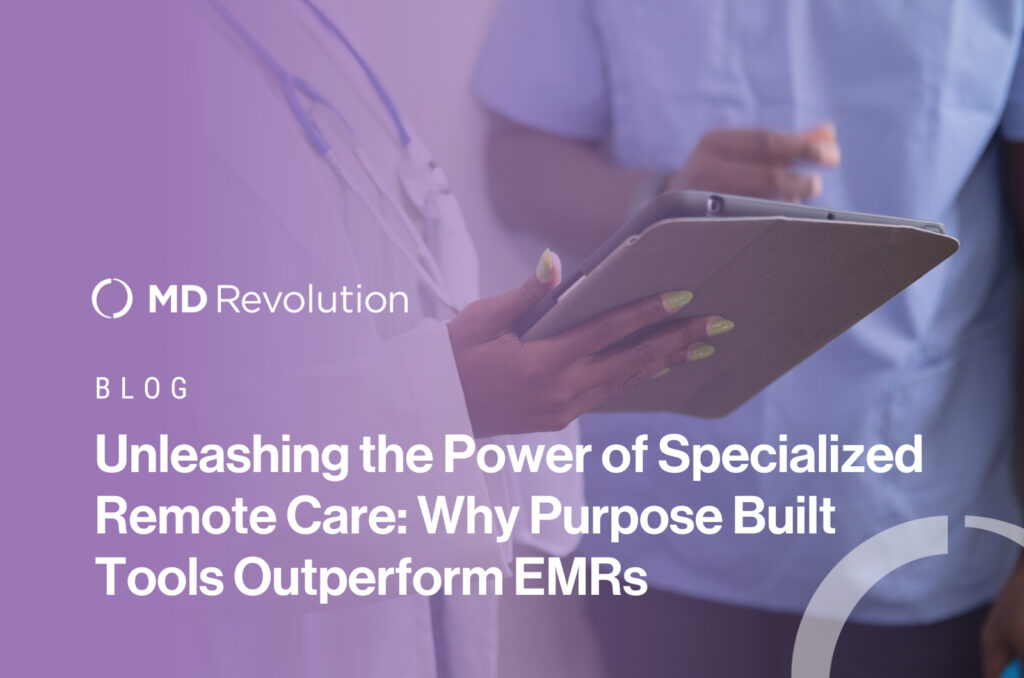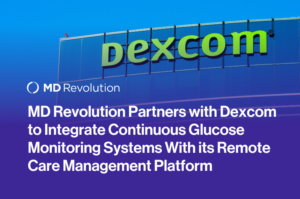The ability to engage and manage chronic care patients is an art form as much as it is a science. Sustaining that engagement among individuals and populations requires clinical and technical expertise, robust digital tools and insights about health data over time.
While electronic medical record systems are a solid foundation for billing, maintaining records, and clinical workflows, EMRs are simply not designed for care delivery. That requires specialized remote care solutions.
Even more powerful: integrating remote patient monitoring and chronic care management tools with an EMR. According to new research from Sage Growth Partners and MD Revolution, in fact, 64% of 141 healthcare provider executives, clinicians, and administrators say EMR integration improves the quality of care.
How, specifically, does integrating remote care solutions with EMRs drive improvements in care quality?
Among survey respondents, 62% say that EMR integration enables data-driven care decisions, and 54% noted that it improves compliance needs. Further, half (48%) say it reduces manual processes and (46%) that it makes billing and coding easier.
In this article, we explore why healthcare systems should consider choosing more purpose-built tools for chronic care management and remote patient monitoring, rather than relying solely on their EMR’s capabilities. The principal advantages of doing so:
- Specialized expertise and dedicated resources
- Integrated technology that enables interoperability
- Improved efficiency via longitudinal data analysis
- Regulatory compliance support
- Patient-centric care management
Specialized Expertise and Dedicated Resources
Today, many healthcare practices are looking to leverage extended care teams to achieve overarching goals — notably increasing care plan adherence, streamlining staff efficiency and maximizing revenue generation and overall financial performance. But the tools designed to simplify and enhance a given patient’s ability to successfully realize their individual care plan are simply beyond the scope of EMRs. Dedicated care management tools integrated with the electronic medical record, however, empower care teams to deliver care between office visits and monitor conditions and results to drive improved outcomes.
Integrated Technology that Enables Interoperability
As much as the discussion and dissatisfaction relative to EMR-to-EMR interoperability has dominated healthcare for the last decade, purpose-built care management solutions offer a key advantage to providers: interoperability with a multitude of EMRs. EMR-agnostic care management solutions enable practices to more effectively leverage patient data with external partners to improve outcomes, reduce unnecessary spending, for example on duplicative tests and results, and do so without disrupting patient care. Additionally, there’s a bonus: This flexibility is particularly important when healthcare organizations transition to new EMRs, such as the rising adoption of Epic.
We prioritize universal EMR integration, allowing systems to migrate effortlessly between platforms without sacrificing the delivery of remote patient care. With a simple push of a button, our clients can deliver uninterrupted remote care, regardless of the EMR in use.
Improved Efficiency via Longitudinal Data Analysis
Chronic disease management requires the ability to track changes over time, analyze longitudinal data, and discern patterns. Unfortunately, most EMRs today still lack the capability to effectively support trending health data and, as a result, the EMRs display information in a way that hinders analysis, slowing down providers as they review each patient’s unique course of treatment. Providers that have access to integrated care management solutions effectively bridge this gap by equipping healthcare professionals with intuitive tools for efficient tracking and analysis of long- term patient data. By streamlining this process, providers can make more informed decisions and deliver better patient care.
Regulatory Compliance Support
Operating in an industry as complex and heavily regulated as healthcare, with its compliance requirements and accompanying penalties, is an arduous challenge. Specialized solutions with built-in regulatory compliance support are essential to ensuring that healthcare organizations can confidently implement synergistic care management programs while meeting all necessary guidelines.
Our solution rises to this occasion by providing time-tested regulatory compliance support, historically aiding client partners through 5/5 passing MAC audits. By alleviating the burden of compliance, we empower healthcare systems to focus unwaveringly on providing exemplary care to their patients.
Patient-Centric Care Management
EMRs, at their core, are built for billing and administrative functionalities — and not, unfortunately, for patient engagement. While EMRs serve as valuable tools for preserving patient records and facilitating clinical workflows, they frequently fall short in delivering comprehensive remote care management capabilities. But with specialized care management expertise, multi- EMR interoperability, functionality for longitudinal data analysis, and regulatory compliance requirements met, care management solutions with a “clinical-first” approach enable health systems, hospitals and practices to leverage technologies to provide healthcare professionals the freedom to focus on their patients. Choosing a technology partner that places patient well-being at the forefront enables providers to deliver personalized and transformative programs to their patients.
Disadvantages of Not Integrating Specialized Tools with Your EMR
In addition to the advantages of integrating remote patient monitoring and chronic care management with an EMR, opting against such integration creates a number of challenges and risks.
Among respondents to our aforementioned survey, 74% say not integrating with an EMR creates more manual work for administrative staff, 30% indicate that it makes billing and coding more complicated, and 26% say that it results in more work for physicians. Additionally, 22% say it decreases their ability to coordinate care, 11% that it reduces the quality of care, 11% that it increases clinical risk, and 7% said lack of integration increases inaccurate billing.
One last reason: 68% of our survey respondents say the remote care solutions delivered a positive experience for patients – or, put another way, patients actually like the programs.
When is the last time your patients said they appreciate anything about your EMR?



